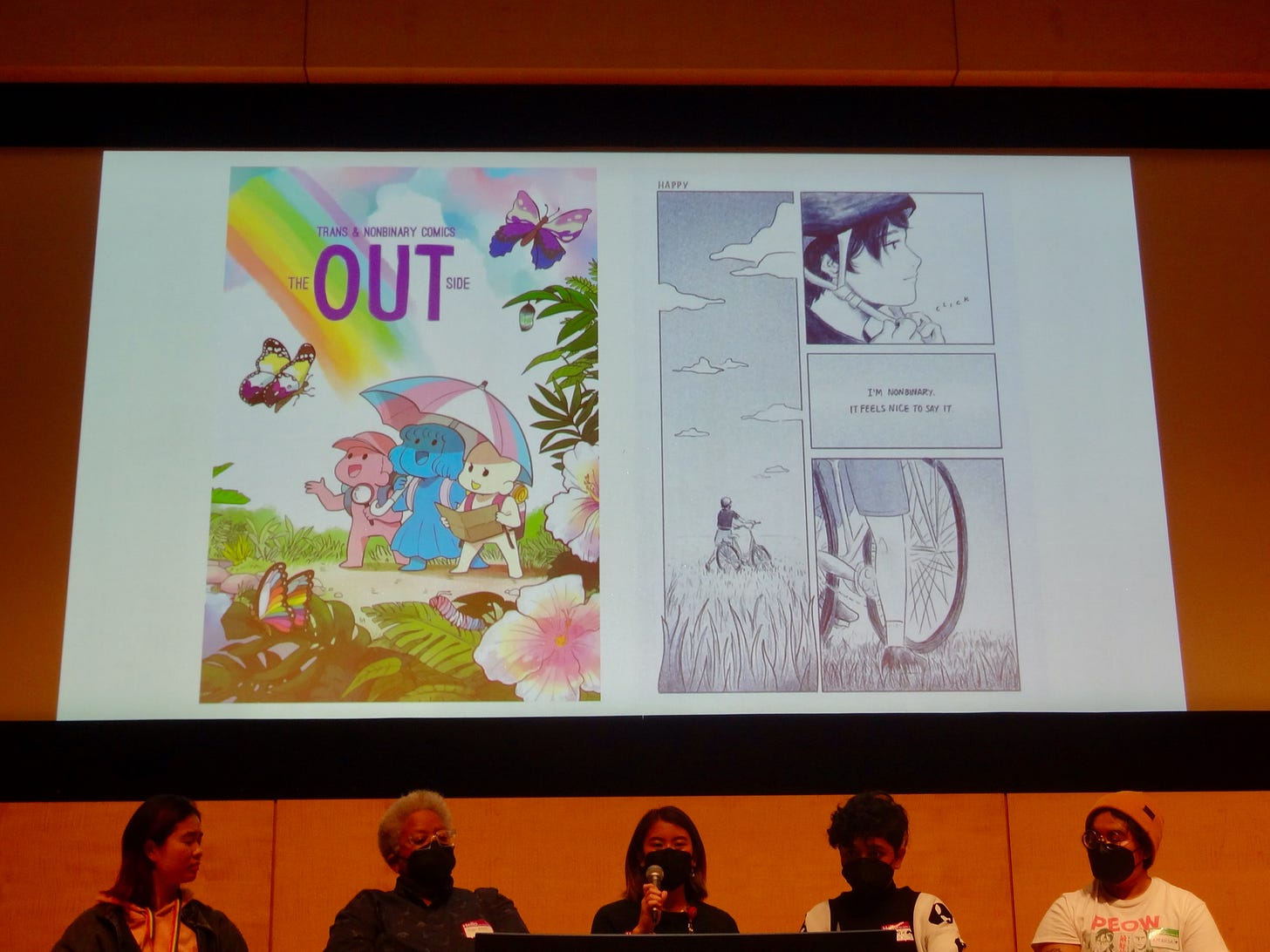There were so many events in February, plus I had a home remodel project I was working on, so I got a bit behind on publishing my reports and prioritized the more exciting boys in girls’ sports event. Still, I thought this “queer” cultural event was significant for how it informed me about the various factions of the LGBTQ and how they interacted with each other. The event took place Sunday afternoon five days before the basketball game we attended. I had a cold I couldn’t seem to shake and should have been in bed, but curiosity got the better of me so I donned a mask and kept a low, albeit sniffling profile. Every other person seemed to have a mask on in the close quarters of the library so it was also hard to make out what people were saying and I wasn’t as aggressive at asking questions as I might have been. I wrote my report a couple of days later.
On Sunday I joined a sex-realist buddy at the San Francisco Public Library for the first Queer Comics Festival ever. My buddy specifically wanted to check out the “grooming” potential of comics aimed at children so we attended the panel provocatively titled “Think of the Children: Queer All-Ages Comics”. (Panel descriptions and speakers described here.)
This turned out to be an all-female panel, ethnically diverse, and quite young themselves. (I think having no men was intentional; men tend to want to write about their first erotic encounter which would not be a good look where children are concerned.) The work of these women, I would categorize as juvie comic books, ranged from old-school memoir from the Black butch lesbian to fantasy love stories (one with a person with cat ears) from a Japanese creator to reality-based storytelling from the remaining two — one South Asian, one of Mexican heritage.
The last also identified herself as a lesbian. During the question and answer period, she was asked by a trans woman (a man identifying as a woman) if she wrote trans stories.
“I’m binary,” she explained without apology, “so I don’t write trans stories.” The trans woman, who was also a comic book artist with a table at the festival, accepted the answer and no more was said. So that’s how the kids are getting along. Saying "I’m binary" is as good as saying I’m a member of a different sect of this religion.
As far as grooming, my attention was directed towards an anthology called "Trans & Nonbinary Comics: The OUT Side" (samples included in the link), with a decidedly children's picture book cover, whose stories featured struggles of medically augmented trans youth who spend most of their time trying to fit their ideologically driven trans identity into a reality-based world. Body modifications are prominently shown.
The inclusion of Asian butch/femme relationships, in this anthology, using preferred pronouns in English is an interesting capture as Asian languages do not have more than one pronoun. It feels exploitive, yet again, and also assimilationist here in the US, for which we are famous...
I hadn’t meant to stay long, but I was glad I came as I have not been exposed to the comic book scene apart from the works of friends and a few graphic novels. The author of Gender Queer, the “most banned book in America” was there. (My review here.) The trans presence was mostly represented by trans women (men) who are easily spotted. Women who have had trans surgery (double mastectomies) largely look like lesbians to me.
The crowd packed into the space the library had on their meeting room floor made it a crowded event, but I persevered from table to table and made eye contact with the authors to exchange a few words. A surprising number of Asian women, but anime is, after all, Asian. Handmade books also abound here.
One Black man proudly showed me a published anthology, he had a piece in, called “We Belong: An All-Black, All LGBTQ+ Sci-fi and Fantasy Comics Anthology”. Note the word “queer” is not used.
Gay men (white) anchored the published works. I once had a liking for gay porn in short story form, but in comic book graphics NO. Just too scary a graphic for me. Nor did I attend the panel titled "Graphic Content: Queer Erotic Comics".
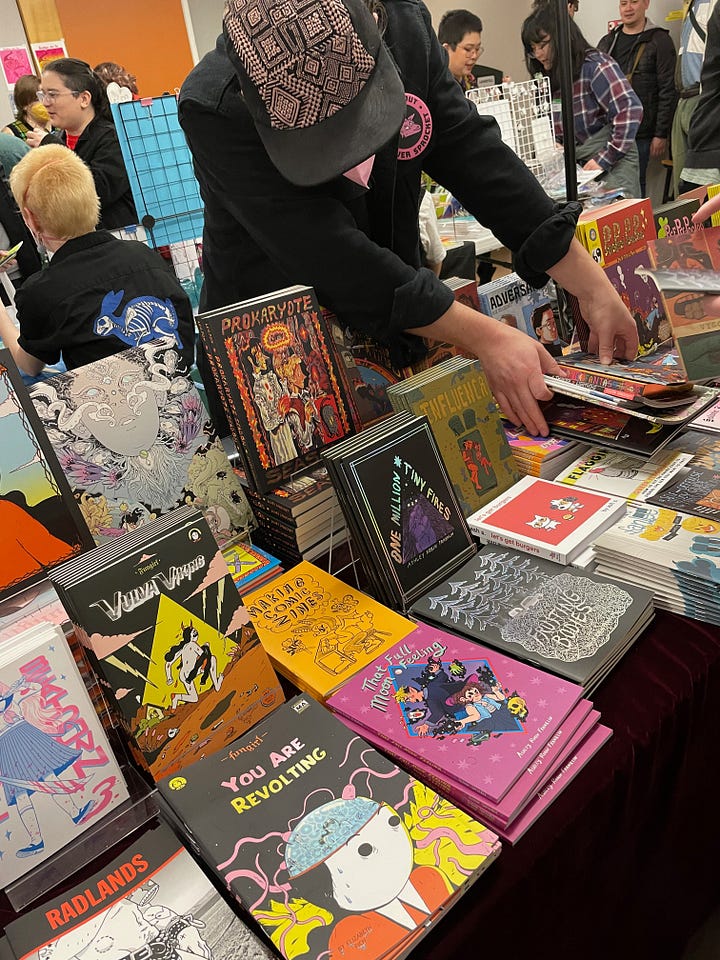
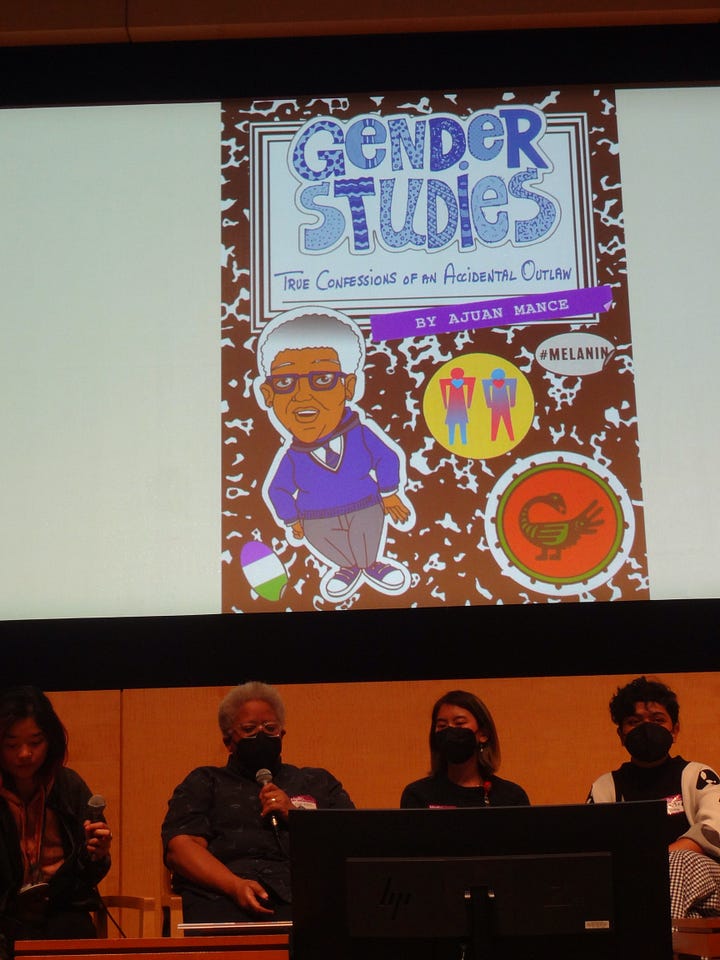
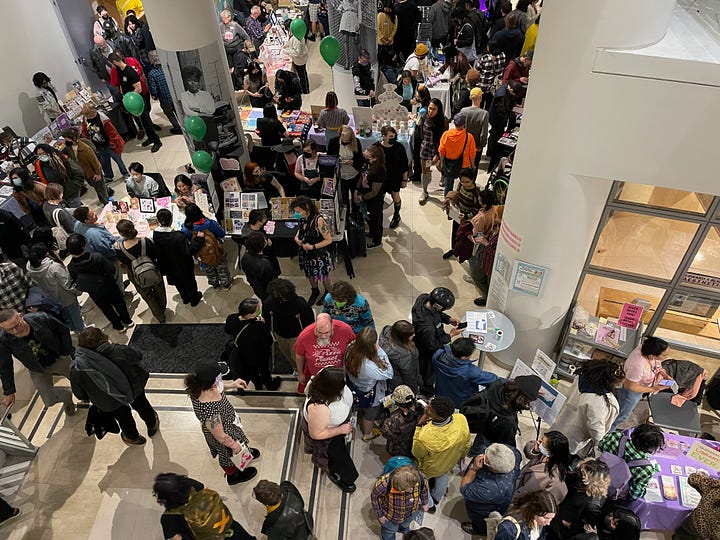
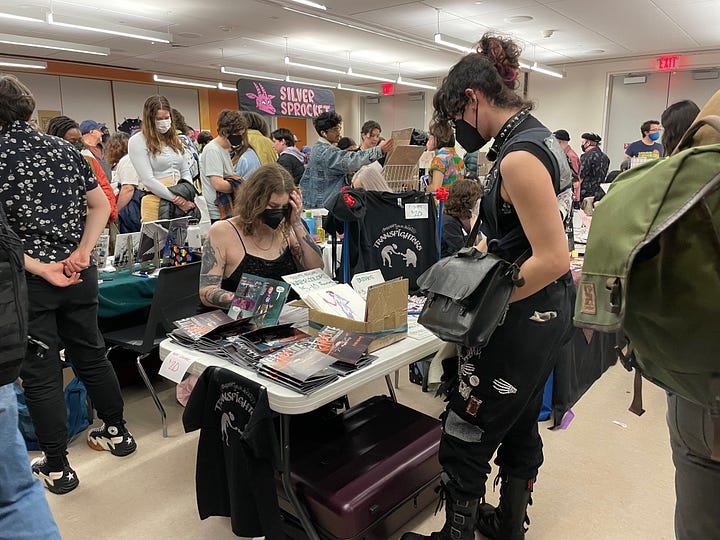
I thought this event had a lot to offer in the way of insight into today’s Queer culture much as the gay film festival had offered me for 30 some years. However, unused to the comic book genre as I was, it took me a good hour to become oriented to the scene and I wasn’t quite up to taking full advantage of the cultural riches that it offered. I wished I had browsed more closely the comics of the panelists and others I came across, maybe even buying some issues to investigate how the LGB were faring amidst the trans dominance. As a visual art form, comics are a quick and accessible way to present a story and offer visual representation for a culture.
I was also pleased to pocket the phrase “I’m binary” as a cultural talisman. In case I found myself in a dark queer alley I could just state my particular religious sect in such a non-confrontational manner as the lesbian panelist had done. I reported this phrase to my fellow gender heretics who pointed out that it was sidestepping the unhinging from reality aspect of the term non-binary by creating another category, but nevertheless was an interesting development in the culture.
As for the grooming aspect, I would say that there was definitely presentation of trans ideology, and the inclusion of mastectomy scars on characters normalized body modification as part of a trans identity. Whether children would be exposed to these works was not so clear. Only the graphic novel “Gender Queer” had risen out of this comic book subculture due to having won an award that thrust it into the hands of librarians eager for LGBTQ content for teens. I saw no children present, though my buddy reported that she had spoken to a mom who drew comics for her trans child. A mom who seemed unconcerned about the long term effects of cross sex hormones and just thought it wonderful how such hormones could transition a child. This was clearly a culture that was entranced by what was being made possible by medical intervention regardless of the long term consequences.




